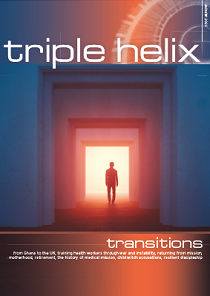Professionally
Although I had tried to keep up with developments in general medical practice (as well as in leprosy), I had underestimated how much British general practice had changed since finishing my GP vocational training in 1981. I had no experience in keeping medical records on a computer. I was surprised by how few home visits were undertaken. I was amazed at how many apparently healthy people were cancer survivors. I was perplexed to see how many older adults were on long-term polypharmacy prescriptions. I was unfamiliar with the Quality and Outcomes Framework (QOF), which seemed to dominate much of the thinking about patient care. Even to work efficiently in a small practice as a part-time sessional GP with the kind support of colleagues was very challenging. Seeing me, a 55-year-old woman at work as a qualified GP, patients naturally assumed I had about 30 years of experience in this type of work. The discrepancy between their expectations and my reality (no British general practice work since a couple of locum fortnights in 1981) made me uncomfortable.Culturally
After living amongst impoverished people in resource-poor communities for so long, I was appalled at the extravagance, materialism, and waste I observed in East Sussex. This was incomprehensible to me and probably made me appear mean when I avoided expenditures that seemed trivial to others.Although I had visited the UK many times since 1982 and maintained a constant stream of two-way correspondence with a range of UK residents throughout my time abroad, I was not as well-informed as I thought regarding changes in UK culture. The England of the twenty-first century, into which I hoped to become integrated, was not much like the England of the 1980s, which I had physically left behind (but kept in my head). Over that period, family break-up and reconstitution through divorces and remarriage (or just changes of partner) seemed to have become the normal lifestyle. Safeguarding had become a significant part of social life, whether in professional or voluntary work, with the result that (with some difficulty, because I had been out of the country) I soon had acquired a collection of CRB/DBS [1] certificates. One problem I did not expect to face with this move was learning a new language. However, I soon found that my unconsciously 'foreign' pronunciation marked me out as somehow different. It was the only outward sign of the invisible change inside me.
Until that time, I had scarcely realised the extent to which my perspective on world issues might differ from that of people who had always lived in the UK. Some of my new neighbours seemed not to appreciate that they were part of the privileged minority in the world. But I had to learn to recognise there were also unmet needs in my rural community. These included the loneliness of elderly people who could not easily go out, the despair of those whose loved ones developed dementia, and other semi-hidden problems like alcohol dependence in middle-aged, middle-class professionals. Looking around to see who were the marginalised in British society (equivalent to the leprosy-affected people in Bangladesh), I saw that those with serious enduring mental illness who needed to be detained under the mental health act were a largely unseen group of sick people. So, I became a voluntary associate hospital manager for Sussex Partnership NHS Trust, working to protect patient rights and show them compassion. [2]
Personally and domestically
Having lived in staff quarters on a mission hospital compound for 25 years, moving to a private house presented some challenges. Had I needed to buy or rent a place and live alone, I might not have coped, being unused to managing household affairs and maintenance myself. I was blessed in that I moved in with my father (who needed a companion since my mother had died the previous year). He gave me an informal introductory course in household management!Initially, one of my problems was being unable to prove my identity since I had no documents (such as utility bills) bearing my home address. I had a valid driving licence, but - not having driven a car in the UK since 1982 - I would not have been safe on the roads alone and in charge of even an automatic vehicle. A neighbour who was a trained driving instructor generously gave me some lessons, and my father bravely sat with me as he had done when I first learned to drive in 1977. It was good for me to take a job, albeit part-time, as the work environment helped me to get to know people and indeed gave me a social role other than that of 'returned missionary'. This was more important than the financial benefit of working since my taste was for an inexpensive lifestyle. Finding some secular voluntary work (in Girlguiding) gradually introduced me to others outside the narrow circle of people I already knew in the area.
Spiritual aspects
Although I had been living in a predominantly non-Christian society while abroad, because most of my close colleagues and neighbours in the staff quarters were believers, and the organisation for which I worked was an overtly Christian NGO, I had existed in a Christian bubble where daily staff prayer times and open discussion of the spiritual aspects of the work were routine. Suddenly I found myself as part of a minority of the UK population who acknowledged Christ. I was now unsure how to express my faith publicly.I attended the local parish church but soon discovered that most of the congregation did not live in the parish. Belonging to the village church congregation helped me to understand the local lifestyle better and led to individual friendships as well as opportunities for service. Being a member of an Anglican church again (as in my youth) reintroduced me to the treasures of the liturgy, and it was such a pleasure to worship (and hear sermons) in my own language week after week! My soul benefitted from this nurture as I adjusted to a new phase of my Christian pilgrimage.
A biblical model to heed
Shortly after I arrived in western India, circumstances arose that threw doubt on the feasibility of my staying long-term. I felt reluctant to put down roots, which might soon be torn up. About this time, our superintendent had invited someone from Pune Theological college to give Bible teaching to our staff. He spoke on Jeremiah 29, and it seemed to me a personal message. God told his people (who had not chosen to relocate to Babylon), 'build houses and settle down; plant gardens...marry and have sons and daughters...seek the peace and prosperity of the (place) to which I have carried you...'. ( Jeremiah 29:5-7) Translated into the language of my situation, it was 'build a home, settle down, learn the language, make friends, seek the welfare of the place where I have put you...' even though you do not know for how long you will be there.This lesson served me well in 1984, and I applied it again in 2007. The passage continues, 'I know the plans I have for you, declares the Lord', (v11) which is most reassuring when you have no clear plans of your own and hesitate to formulate your hopes.
Conclusion
'Coming home' to one's own country after many years abroad is more complicated than it might appear. One has to be constantly alert for situations where one makes the wrong assumptions and could unwittingly offend someone. One has to expect to be misunderstood at times when the global perspective on issues which comes naturally to you clashes with the more parochial outlook of the local people. Tolerant Christian friends or relatives who are prepared to give candid feedback are invaluable. Deliberately targeted efforts to become meaningfully involved in community activities help a lot, and the local church is a key place to start. Recognising another mission field in the place where one now is, arouses a renewed sense of vocation, while using one's past experiences to help to open the eyes of local people to the wider world is another ministry to accept.Ruth Butlin is an ex-missionary and retired GP; she is also part of the Triple Helix editorial committee































